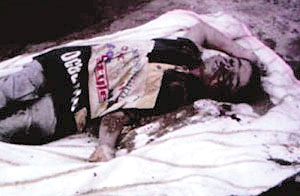Current CIA director Porter Goss admitted in the Washington Post yesterday that the CIA does indeed have a secret prison system outside the USA, including on locations in Eastern Europe:
Goss did not deny the existence — reported earlier this month by The Washington Post — of a secret CIA prison system overseas that has included sites in Eastern Europe. Asked why the United States needed secret prisons, Goss said: “We’re fighting a war on terror. We’re doing quite well in it. Inevitably, we are going to have to capture some terrorists, and inevitably, they are going to have to have some due process, and inevitably, that is going to happen, and it’s going to be done lawfully and under all of the law and order and protections of due process that this country affords.”
In the same article, Condi Rice is also quoted, displaying the same historical insight and intelligence that made her Secretary of State:
In an interview published today in USA Today, Rice indicated she intends to remind Europeans that “we are fighting a war on terror” and that the United States must take certain actions “in order to protect not just ourselves but to protect others.”
She added: “We haven’t ever fought a war like this before. We’ve never fought a war before . . . where you can’t allow somebody to commit the crime before you detain them, because if they commit the crime, then thousands of innocent people die.”
Meanwhile, the European Union is less than happy with this situation, as it is hinted that one of the countries in which these prisons are located is a memberstate (Poland) and one is a candidate member state (Romania). So unhappy in fact, it’s threatening sanctions against any memberstate involved in this:
Franco Frattini, the European commissioner for justice and home affairs, warned that any countries found to be allowing the CIA to operate the detention centres – part of a global secret gulag used to hold al-Qa’ida suspects and other “ghost detainees” – could have its voting rights suspended.
It’s uncertain how real these threats are, but Romania at the very least could see itself stuck outside the EU for considerably longer than otherwise would’ve been the case. Smartarses can of course wonder what exactly the difference is between these CIA prisons and something like Belmarsh Prison… Poland could at least strike back by demanding inquiries into which EU countries participated in extraordinary rendition.
Meanwhile, closer at home, all the furore about how exactly the US is treating its detainees has caused problems for the Dutch government. Dutch forces are still active in Afghanistan as part of the peace force there and the Netherlands has been asked to extend its mission for at least another two years, to form part of a stablisation force in the province of Uruzgan, not the most safe of provinces. Already wary of becoming embroiled in internal Afghan conflicts, which may lead to numerous Dutch casualties and resulting political fallout, parliament has also become wary of the American treatment of Afghani prisoners.
And not just parliament. The minister of Foreign Affairs, who had earlier said he thought the war on Iraq was a “mistake”, also has his doubts about this. Granted, for many parliamentaries the risk of Dutch casualties will be the main reason to vote against extending the Dutch mission in Afghanistan, but at the very least the concern about American treatment of prisoners will make a good excuse to refuse.
